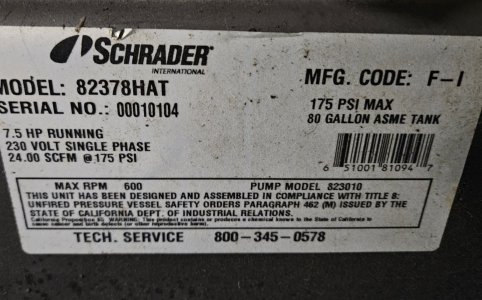- Joined
- Jun 6, 2015
- Messages
- 303
I leave mine full, with a ball valve to shut off the whole system.
When I'm not using it, I shut the compressor off - With the tank full, and the power off, there's still pressure a week or more later.
If there's 125psi in the tank when I shut it, there will still be at least 90-100 psi left.
I've learned not to leave the system open to any quick connects, with or without tools attached, if I'm not using it - The tank valve is the key.
When I'm not using it, I shut the compressor off - With the tank full, and the power off, there's still pressure a week or more later.
If there's 125psi in the tank when I shut it, there will still be at least 90-100 psi left.
I've learned not to leave the system open to any quick connects, with or without tools attached, if I'm not using it - The tank valve is the key.
Last edited:


